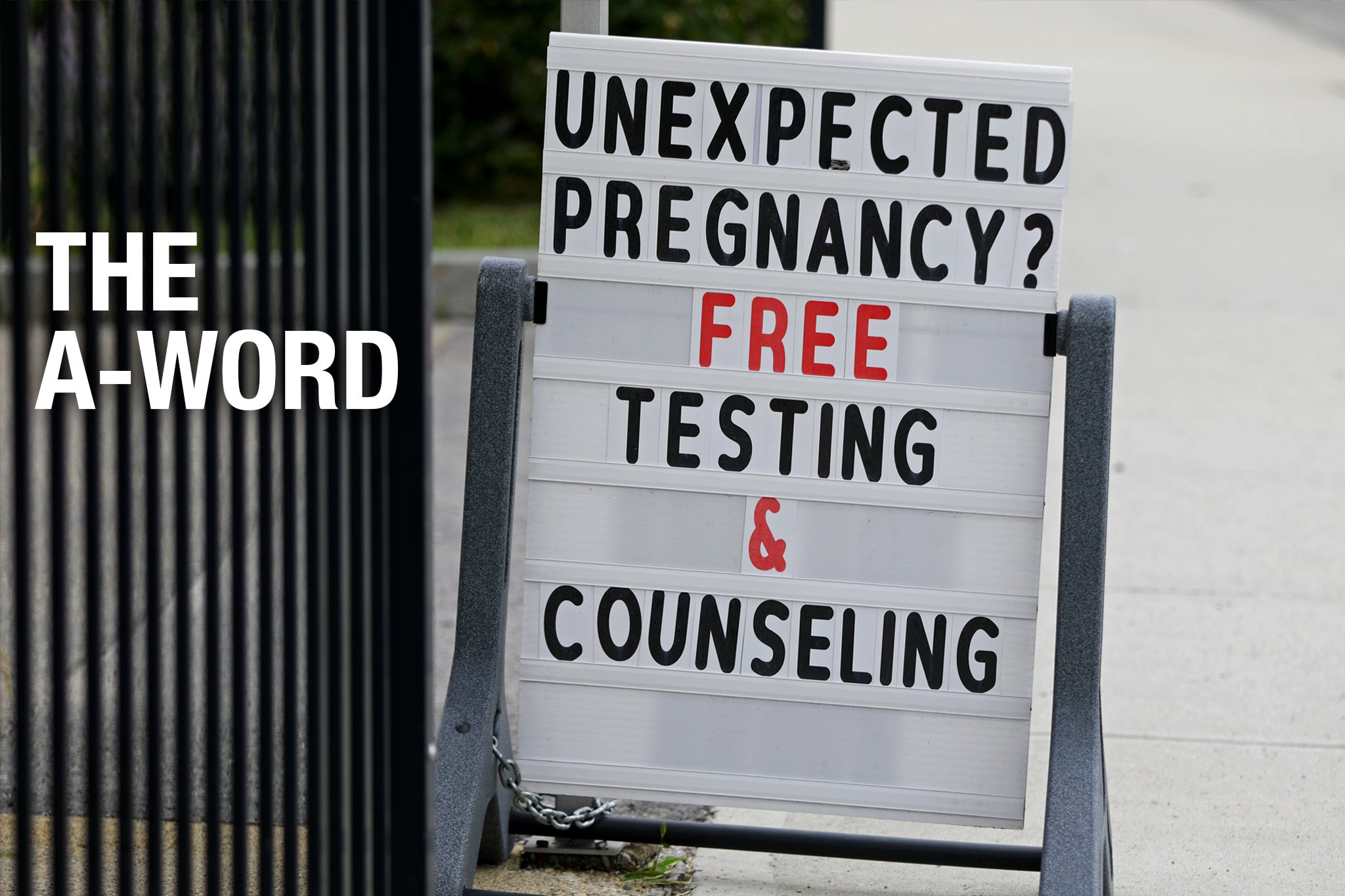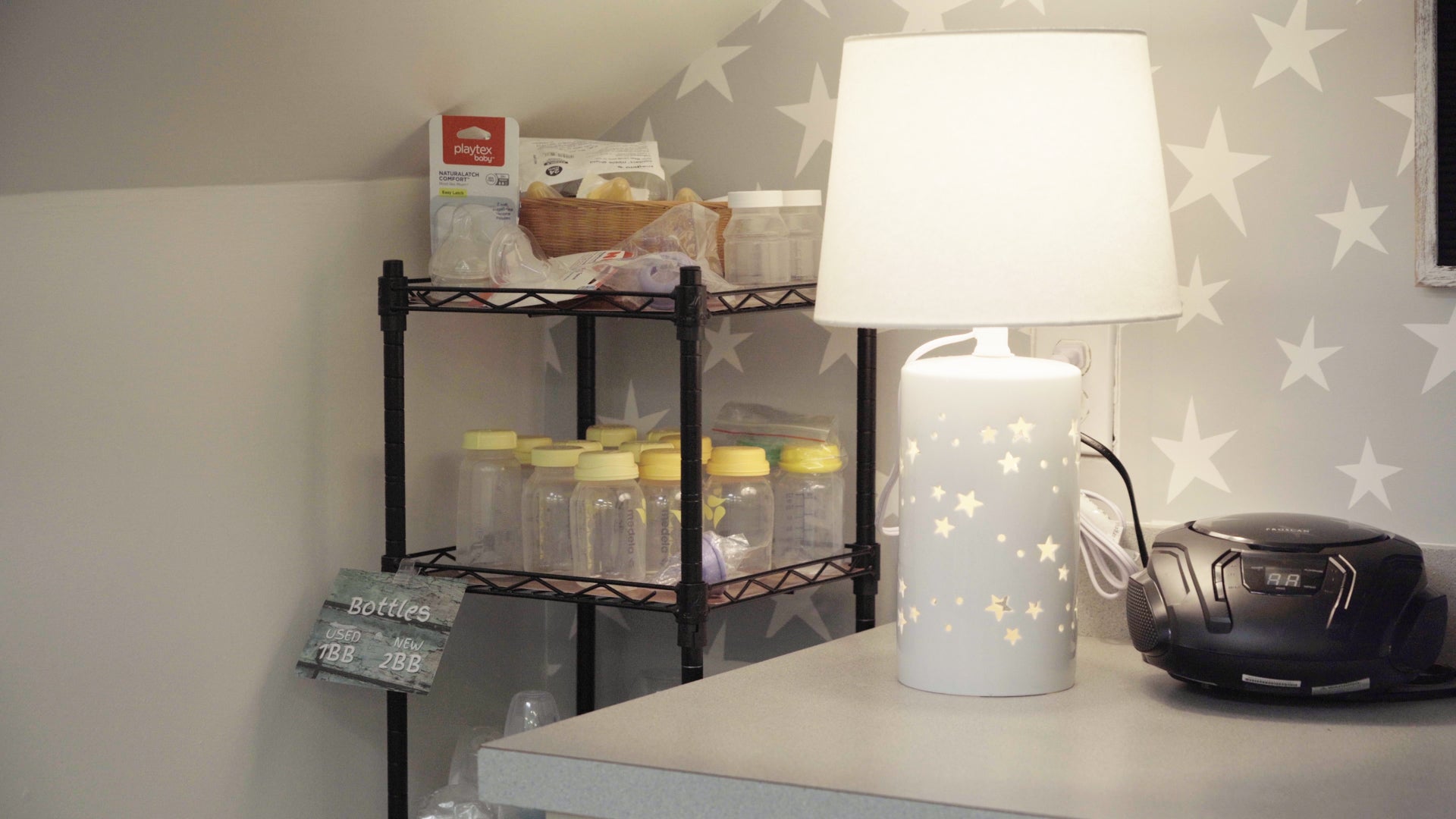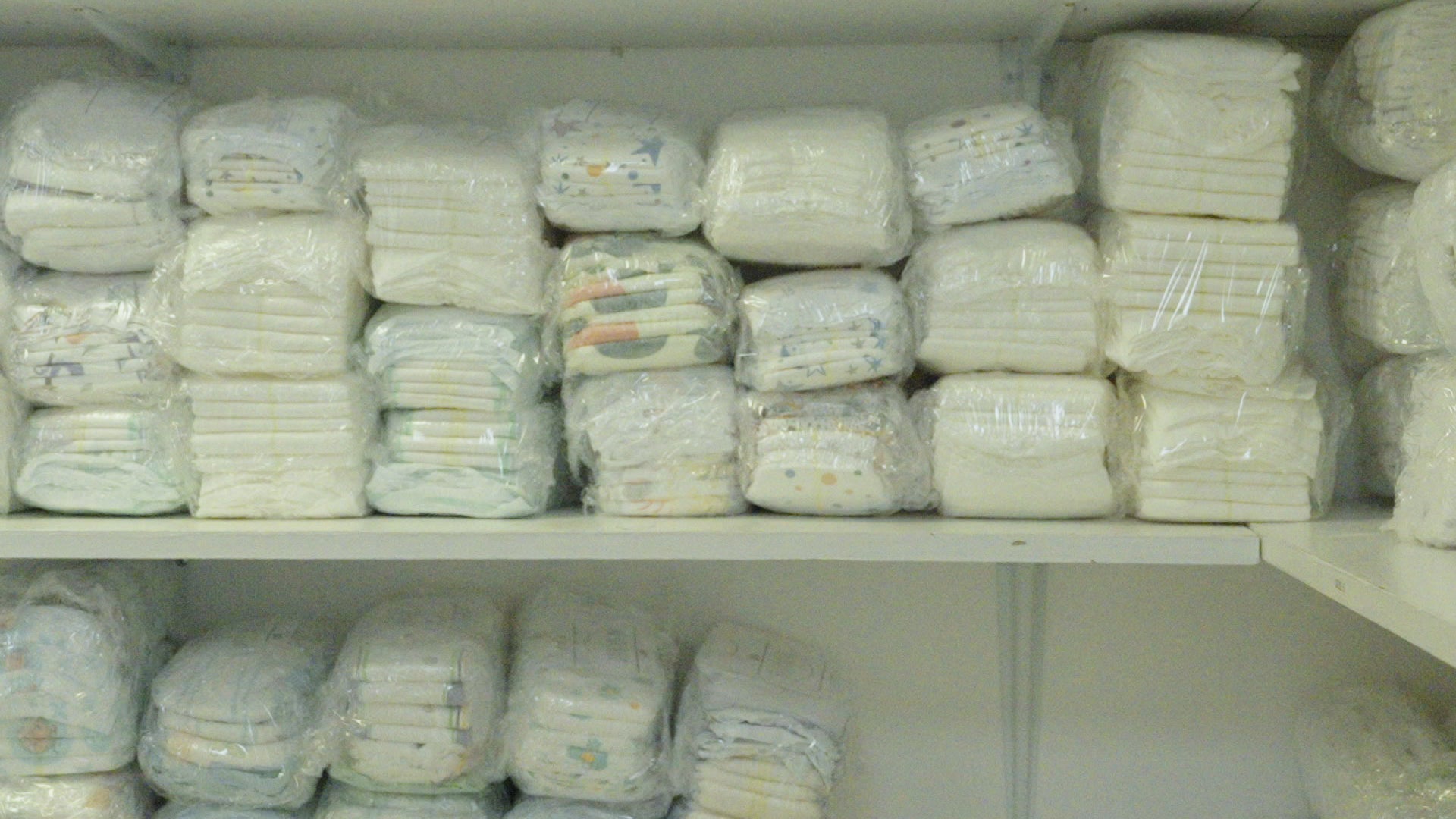‘Low-budget horror movies’ of babies being ripped apart and promises of ‘baby bucks’: How fake pregnancy clinics pressure women not to abort
Religious themes and ads for ‘abortion pill reversal’ are staples at fake abortion clinics, which now significantly outnumber real clinics. Kelly Rissman reports


Your support helps us to tell the story
From reproductive rights to climate change to Big Tech, The Independent is on the ground when the story is developing. Whether it's investigating the financials of Elon Musk's pro-Trump PAC or producing our latest documentary, 'The A Word', which shines a light on the American women fighting for reproductive rights, we know how important it is to parse out the facts from the messaging.
At such a critical moment in US history, we need reporters on the ground. Your donation allows us to keep sending journalists to speak to both sides of the story.
The Independent is trusted by Americans across the entire political spectrum. And unlike many other quality news outlets, we choose not to lock Americans out of our reporting and analysis with paywalls. We believe quality journalism should be available to everyone, paid for by those who can afford it.
Your support makes all the difference.This story is part of an investigative series and new documentary, The A-Word, by The Independent examining the state of abortion access and reproductive care in the US after the fall of Roe v Wade.
When 20-year-old Maleeha Aziz walked into a crisis pregnancy center in Texas 11 years ago, she knew exactly what she wanted: an abortion.
On her way to the exam room, something “felt a little off” when she walked by a crucifix hanging on the wall. Aziz, who had recently emigrated from Pakistan, brushed it off as not fully understanding American culture. But that uneasy feeling only escalated when she was told she “needed to” watch a video — a video that turned out to be a graphic depiction of a baby’s limbs being ripped apart. It wasn’t until she was told that the abortion pill had been banned in Texas that she became an “absolute mess” and left.
Despite the name, crisis pregnancy centers (CPCs) do not offer medical services to pregnant women in crisis. Instead, the facilities are typically run by religious anti-abortion groups trying to steer patients away from getting abortions.
CPCs aren’t new. They have operated for decades, but since Roe was overturned in June 2022, they have become more prevalent as real abortion clinics across the country have been forced to shutter. CPCs now outnumber real abortion clinics by at least three to one. Across the US, there are now at least 2,500 CPCs — as compared to just 765 abortion clinics.
CPCs can be hard to distinguish from real clinics. From the outside, they resemble real clinics. They are frequently located near genuine abortion facilities and often take similar names, with some even calling themselves a “medical center” or a “clinic” to sound “more medicalized,” according to Andrea Swartzendruber, an associate professor at the University of Georgia’s College of Public Health.
Crucially, they advertise low-cost tests and ultrasounds.
CPCs have been criticized for the tactics they use to dissuade women from terminating their pregnancies. These tactics, according to women who have been to some of these clinics, range from incorrect due dates, promises of assistance once the baby is born and disturbing imagery of fetuses and dead babies. In combination, this effort is meant to persuade women from seeking a termination — or causing them to delay until it’s simply too late or expensive to have an abortion.
The Independent’s The A-Word visited CPCs in the south. They say they are clear with patients about the services they offer and are there to help women in need.
One clinic we visited said they don’t show videos to their patients “because the truth is enough”.
A clinic manager said: “We could not even conceive of misleading our clients. We're going to be upfront with them right away about what we do and what we don't do. We're going to say we offer you these things.
“The idea of deceiving the women we are here to serve is unthinkable.”

‘I was shown a low buget horror film’
After learning she was pregnant in 2013, Aziz was sure she wanted a medication abortion but first needed to determine how far along she was. Her gynecologist only saw pregnant patients after eight weeks, so she began looking for other options.
She asked a cousin in medical school to help her find an affordable place that she could pay out-of-pocket for an ultrasound and was sent a list of places that seemed to fit this description. But the cousin had unwittingly included CPCs.
“It was a smaller clinic with biblical imagery,” she says. Elderly women in white lab coats greeted her before handing her a pregnancy test.
“I thought it was a little weird but I kept second-guessing myself and kept telling myself: ‘I’m an immigrant, maybe I’m not used to it and that’s how it is here.’”
After filling out some paperwork, the women led her and her partner into a room and closed the door. They didn’t lock the door, but they gave the impression that she was supposed to stay put: “You didn’t feel like you could just leave.”
Almost immediately, she wanted to do just that. The women played a 20-minute video. “I would describe it as a low-budget horror film,” she said. “There was a man wearing a white lab coat, posing as a doctor, who takes surgical tools and rips apart a baby limb to limb and tells you: ‘If you’re having an abortion, that’s basically what you’re doing to a baby’.”

They then offered her assistance with infant necessities.
“There’s a curriculum called ‘earn while you learn’ and basically it’s a point system where you earn money, money or ‘baby bucks’ or ‘daddy dollars’,” Swartzendruber says. Individuals can earn “points” by going to a Bible study or church, watching a video, or taking a class, and in exchange, they can redeem baby clothes, diapers, wipes and other necessities.
The facility’s true mission quickly became apparent to Aziz: “I knew what their agenda was…I didn’t mention wanting an abortion. We played it as if we were trying to have a baby, and we were happy about this. They played their game with us, we played their game with them.”
But she was still duped by some of their “lies.” She says that not only was she told that an abortion would result in breast cancer, but that staff telling her that “medication abortion was so dangerous” that Texas had banned it. The latter claim wasn’t true a decade ago, but in her vulnerable state, Aziz bought it.
She left the facility and frantically called clinics across the country to find one that would provide her with the abortion pill. She found one in Colorado that would see her days later.
“Violently sick” from first-trimester symptoms, Aziz took a two-hour flight she couldn’t afford. A family member later stepped in to cover the costs, she said.

It wasn’t until five years later, during her orientation at the Texas Equal Access Fund — a nonprofit that offers financial and emotional support to Texans in need of reproductive care — that she discovered she had visited a CPC. It was “infuriating” to learn that she endured the financial, logistical, and emotional stress just “to take a pill I could have just been able to do in my own home,” Aziz said. “I could’ve had an abortion in Texas all along.”
That’s no longer the case.
Since 2022, abortion is illegal in Texas except in very specific cases, including when the mother’s life is at risk. The red state now has three abortion laws, including one that threatens to put abortion providers behind bars for life. Although there are now no abortion clinics in the state, there are 198 CPCs.
Despite their names and white lab coats, they do not provide many medical services and some rely on volunteers, not licensed medical professionals. That means that a staffer may be able to perform an ultrasound but, without a medical license, cannot offer any additional insight, which can be dangerous in the cases of ectopic pregnancies, for example, which necessitate termination.
“The ultrasounds that they provide are non-diagnostic, so they’re not looking for problems with the fetus. They’re not looking for problems in the pregnant person,” Swartzendruber says. “They’re using it as a strategy to try to influence pregnancy decisions.”
For unknowing patients, the combination of white coat-wearing staff with the sterile environment and medical terms can be very convincing.
‘It makes you the mother of a dead child’
According to Carrie — a 28-year-old abortion advocate in Florida who asked to remain anonymous for her own protection — the CPC industry deceived her before she even walked into the facility’s door.
She was 19 when she discovered she was pregnant in 2015. Hopeful that her result was a false positive, the then-college student sought out another pregnancy test to confirm it.
She typed “What to do when you think you’re pregnant” into an internet search bar, and found a clinic touting free pregnancy tests.
“‘Free’ was the main word that I saw,” she tells The Independent.
When she got to the center, she felt comforted by the “mom-like” women in white coats who welcomed her. That feeling quickly faded when one of the women asked if she would opt for “parenting, adoption or other.”
Carrie said: “I felt gutted. I already knew at that point what needed to happen in my life: I was seeking an abortion. And so I had to write that in. I felt really embarrassed and nervous by that.
“When they took my application, I heard them whisper to one another: ‘Oh, she’s abortion-minded.’”
The staff condemned abortion in stark terms: “This doesn’t solve your problem. It makes you the mother of a dead child,” she says they told her.
Despite the CPC’s efforts, Carrie was undeterred and sought an abortion elsewhere. With her part-time job, she saved money, and, a month later, paid $300 for the procedure. She opted against being sedated because it cost more.
Free medical services, like pregnancy tests and ultrasounds, are part of CPC’s allure. And the anti-abortion activists who run them know it.
“CPCs exist because we have such severe gaps in our healthcare system in this country,” says Swartzendruber.
The facilities particularly target young people, people of color, and those with low incomes. Not only do these groups have the most trouble accessing healthcare, but they also are the most likely to get abortions.
More than half of those who receive abortions are women of color — 42 percent are Black and 22 percent are Hispanic, as compared to 30 percent who are white and 6 percent who are Alaska Native, American Indian, Asian, Native Hawaiian or other Pacific Islander, according to 2021 CDC data. And more than half of those getting abortions — 57 percent — are in their 20s. It’s little wonder, then, that many CPCs are located near high school and college campuses.
Carrie is hardly alone in being misled by an internet search. CPCs poured an estimated $10.2 million into Google Search ads from 2021 to 2023, according to a report from the Center for Countering Digital Hate (CCDH). The report says these ads were clicked an estimated 13 million times.
CCDH also found that 40 percent of the Google ads include the phrase “abortion pill reversal,” an unproven and untested method to supposedly undo abortions. These ads are so prevalent and misleading that New York Attorney General Letitia James in May sued international anti-abortion association Heartbeat International and 11 other groups with CPCs for deceptive marketing practices.
And that’s just the tip of the iceberg of CPCs’ sprawling campaign.
Abortion advocates have warned about a few other telltale signs of CPCs: “abortion reversal” ads, opposition to contraception, and getting the runaround when asking about abortion pricing.
No legitimate abortion clinic would be indirect about the cost of the procedure, Abortion Access marketing manager Moji Alawode-El says: “Call and ask outright if they do abortions, and if they hedge, then that’s probably not a place that is going to give you accurate medical advice.”
Delay tactics
In the early 2000s, Moji Alawode-El was in need of a pregnancy test. She saw a subway ad that read something like “Pregnant. Need help,” and she followed it. The ad led her to an office building in New York City. When she took the pregnancy test, the staff member said: “Congratulations, you’re gonna be a mom!”
Congratulations couldn’t have been further from Alawode-El’s mind. She knew that at 24, without health insurance or a stable job, it was not the right time for her to have a child. So, she told the staffer that she wanted to terminate the pregnancy and asked for the abortion pill.
She was told they were “all out” and to call back in a week.
Alawode-El thought that was strange. Not only was she the only person in the facility at the time, but she also figured acting fast was a priority.
With abortions, timing is crucial. The abortion pill becomes less effective over time and can only be used within the first 11 weeks of pregnancy. After that point, the only option is an expensive procedure. Planned Parenthood warns that the odds of complications increase the longer a patient waits.
Alawode-El called the following week and was told the center still didn’t have the medication but she should come back into the office. She never returned and went to a local hospital for an abortion.
“I just feel like my abortion ended up being complicated and delayed by weeks because of this unnecessary visit to a faith clinic,” she says.
Through her work at Abortion Access Front, where she serves as marketing manager, Alawode-El now recognizes that seeing a patient in person is part of the strategy: “When you’re in person, it is much easier to prey on people’s politeness, fear, insecurities, any sort of abortion stigma that they have.”
There are cases, like Alawode-El’s, where CPCs try to delay care and others where they “try to make you feel like you have more time than you do” so patients unwittingly pass the legal abortion limit, Aziz explains. Currently, eight states ban abortion at or before 18 weeks while 13 ban abortion entirely.
Years after she mistakenly visited a CPC, Alawode-El had a child. When she went to get a pregnancy test, this time at Planned Parenthood, she was struck by the “vastly different” reaction to the test results. The clinic staffer asked what she would do if she was pregnant. The staffer “was very much unbiased in how she delivered the news that I was pregnant,” she said.
When pregnant women walk into clinics, they unwittingly fall prey to an anti-abortion machine backed by billions of dollars. Heartbeat International, BirthRight and CareNet are the three main players in the CPC industry, Swartzendruber says.
“The funding has always been a black box,” she added. “It’s very hard to figure out how much money goes to these centers.”
Since 2021, anti-abortion lawmakers in Republican-dominated states sent more than half a billion dollars in public taxpayer funds to the CPC industry, Reproductive Health and Freedom Watch research seen exclusively by The Independent shows.
State legislatures directly appropriated more than $329 million to the CPC industry in 2023 and 2024.
The influx of public funds followed the Supreme Court’s Dobbs decision that stripped the constitutional right to abortion; in 2021 and 2022, the year Dobbs was decided, that figure was roughly $184 million.
While the majority of CPCs’ funding — 87 percent — comes from private donations, some comes from taxpayers. At least 21 states between 2021 and 2024 have contributed to CPCs’ coffers with taxpayer dollars, according to analysis from Reproductive Health and Freedom Watch. Pennsylvania and Minnesota put an end to this funding in 2023 while at least seven states have created new public funding programs for CPCs since 2020.
Texas is leading the charge, having funneled $240 million in taxpayer cash to CPCs from 2021 to 2024, as the state cracked down on abortions. Some CPCs have even siphoned federal funds and grants, with government grants totaling nearly a billion dollars since 2020.
Temporary Assistance for Needy Families program funds made up more than 15 percent — $48 million — of federal funding received by CPCs between 2021 and 2023, according to Health Management Associates. “If you are literally taking resources away from welfare, what does that say about your cause?” Aziz says.
Ten years after getting her abortion in Colorado, Aziz, now a mother of one, says her abortion wasn’t difficult, but the process to get one was.
“The trauma I experienced was not due to the abortion itself, but due to the barriers and logistics,” she said. “I hold the CPCs and their lies [responsible] for all the difficulty I had to go through.”
Join our commenting forum
Join thought-provoking conversations, follow other Independent readers and see their replies
Comments